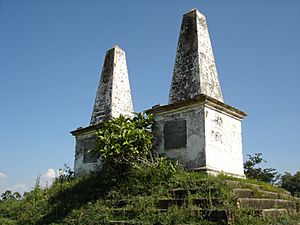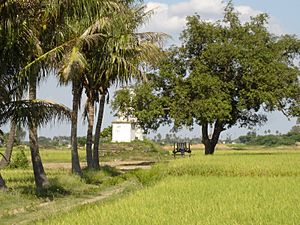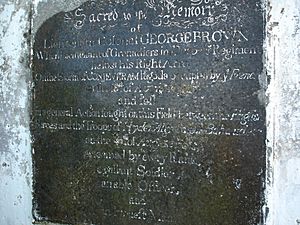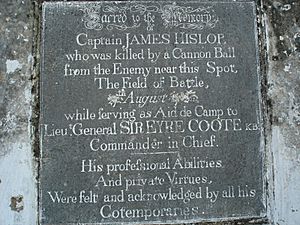Battle of Pollilur (1781) facts for kids
Quick facts for kids Battle of Pollilur |
|||||||
|---|---|---|---|---|---|---|---|
| Part of the Second Anglo-Mysore War | |||||||
|
|||||||
| Belligerents | |||||||
| Commanders and leaders | |||||||
| Eyre Coote | Hyder Ali | ||||||
| Strength | |||||||
| 11,000 | unknown | ||||||
| Casualties and losses | |||||||
| 421 | 2,000+ | ||||||
The Battle of Pollilur was a big fight that happened on August 27, 1781. It was between the army of the Kingdom of Mysore, led by Hyder Ali, and the British East India Company forces, led by General Eyre Coote. This battle took place in the same spot where another fight happened in 1780. In that earlier fight, the Company's army was almost completely defeated.
During the 1781 battle, the British East India Company's army was set up in two main groups. One group fought against soldiers led by Tipu Sultan, who was Hyder Ali's son. Hyder Ali's army lost many soldiers and had to go back to Kanchipuram.
After the fighting, General Coote's army ran low on supplies. So, he moved his soldiers towards a place called Tripassore. Both sides pulled back from the battle. Both armies said they had won by firing a salute. However, the British later called it a "dubious victory," meaning it wasn't a clear win.
The Battlefield Today
Much of the area where the battle happened has changed over time. Farmers now grow rice in many parts of the field.
Two tall stone monuments, called obelisks, stand there today. They remember two officers who fought for the British East India Company. These obelisks are on higher ground than the fields around them. The words carved on them are very old and hard to read.
One obelisk is for Lieutenant Colonel George Brown. It says he was a brave soldier and a good officer. He lost his right arm in an earlier fight in 1780. He died in this battle on August 27, 1781.
The second obelisk is for Captain James Hislop. It says he was killed by a cannonball near this spot during the battle on August 27, 1781. He was helping General Sir Eyre Coote at the time. The monument also says he was a skilled officer and a good person.
 | Janet Taylor Pickett |
 | Synthia Saint James |
 | Howardena Pindell |
 | Faith Ringgold |





